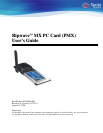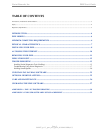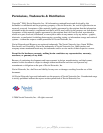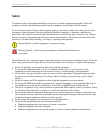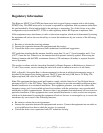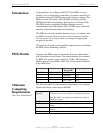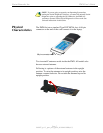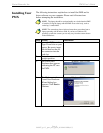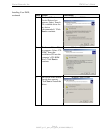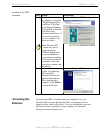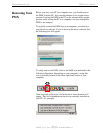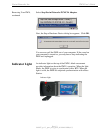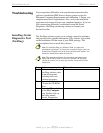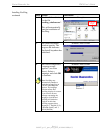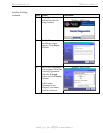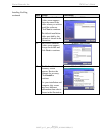
Navini Networks, Inc. PMX User’s Guide
Regulatory Information
This Ripwave MX PC Card (PMX) has been tested with a typical laptop computer with a side loading
PCMCIA bay. This PMX must not be co-located or operated in conjunction with any antenna (other than
the one furnished by Navini and included in the package) or transmitter. Use of this device in any other
configuration may exceed the FCC, ETSI, or other regulatory bodies RF Exposure compliance limit.
If this equipment causes interference to radio or television reception, which can be determined by turning
the equipment off and on, the user should try to correct the interference by one or more of the following
measures:
1) Reorient or relocate the receiving antenna,
2) Increase the separation between the equipment and the receiver,
3) Consult the dealer or an experienced radio technician for additional suggestions.
FCC guidelines stipulate that the antenna should be more than 2.5 cm (1”) from bystanders and 1.2 cm
(0.472”) from the user. When in use, the antenna should be pointed vertically upward. When using the
Desktop Antenna with the PMX, a minimum distance of 20 centimeters (8 inches) is required from the
user or bystander.
This product conforms with the Australian Standard for Human Exposure to Radiation at a distance of
2.5 cm. Closer contact, such as touching the aerial will result in radiation in excess of safe limits.
SAR, or Specific Absorption Rate, is the measurement for the rate at which electromagnetic energy is
absorbed by the human body during exposure. The FCC states the body SAR limit is 1.6 W/kg. The
highest reported SAR value for the PMX card is 0.560 W/kg.
Note: This equipment has been tested and found to comply with the limits for a Class B digital device,
pursuant to Part 15 of the FCC Rules. These limits are designed to provide reasonable protection against
harmful interference in a residential installation. This equipment generates, uses and can radiate radio
frequency energy and, if not installed and used in accordance with the instructions, may cause harmful
interference to radio communications. However, there is no guarantee that interference will not occur in a
particular installation. If this equipment does cause harmful interference to radio or television reception,
which can be determined by turning the equipment off and on, the user is encouraged to try to correct the
interference by one or more of the following measures:
• Re-orient or relocate the receiving antenna.
• Increase the separation between the equipment and receiver. Connect the equipment into an outlet on
a circuit different from that to which the receiver is connected.
• Consult the dealer or an experienced radio/TV technician for help.
Page 5
060825_pv1.3_pmx_user_guide_40-00460-00Ra(4.5)



